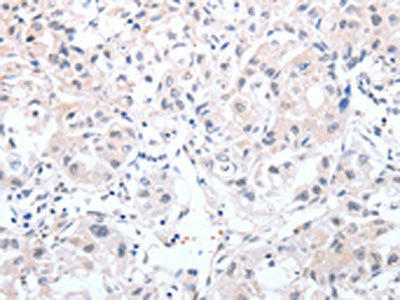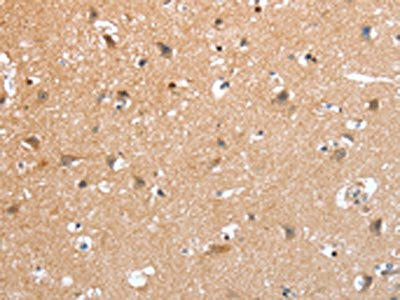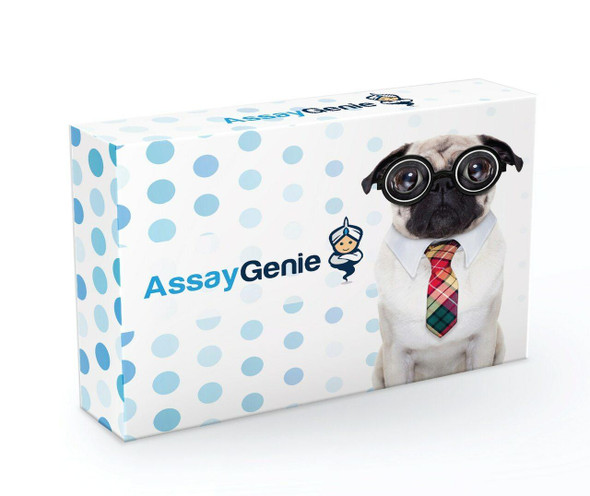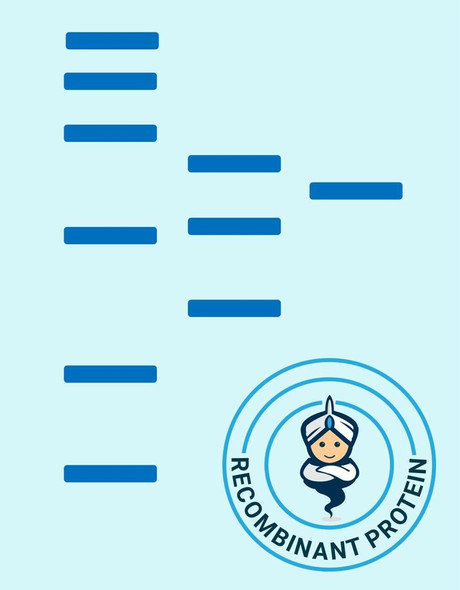Description
| Antibody Name: | PSPN Antibody (PACO18431) |
| Antibody SKU: | PACO18431 |
| Size: | 50ul |
| Host Species: | Rabbit |
| Tested Applications: | ELISA, IHC |
| Recommended Dilutions: | ELISA:1:1000-1:5000, IHC:1:25-1:100 |
| Species Reactivity: | Human |
| Immunogen: | Synthetic peptide of human PSPN |
| Form: | Liquid |
| Storage Buffer: | -20°C, pH7.4 PBS, 0.05% NaN3, 40% Glycerol |
| Purification Method: | Antigen affinity purification |
| Clonality: | Polyclonal |
| Isotype: | IgG |
| Conjugate: | Non-conjugated |
 | The image on the left is immunohistochemistry of paraffin-embedded Human lung cancer tissue using PACO18431(PSPN Antibody) at dilution 1/25, on the right is treated with synthetic peptide. (Original magnification: x200). |
 | The image on the left is immunohistochemistry of paraffin-embedded Human brain tissue using PACO18431(PSPN Antibody) at dilution 1/25, on the right is treated with synthetic peptide. (Original magnification: x200). |
| Background: | The protein encoded by this gene is a neurotrophic factor, belonging to the GDNF family. Neurotrophic factors are important for the proper development and maintenance of the nervous system. These factors promote neuronal survival and can prevent the neuronal degeneration associated with injury, toxin exposure, or neurodegenerative disease. The encoded protein has amino acid, similarity to its other family members, glial cell line-derived neurotrophic factor and neurturin. This gene product promotes the survival of ventral midbrain dopaminergic neurons in culture and prevents their degeneration after 6-hydroxydopamine treatment in vivo. |
| Synonyms: | persephin |
| UniProt Protein Function: | PSPN: Exhibits neurotrophic activity on mesencephalic dopaminergic and motor neurons. Belongs to the TGF-beta family. GDNF subfamily. |
| UniProt Protein Details: | Protein type:Secreted; Secreted, signal peptide Chromosomal Location of Human Ortholog: 19p13.3 Cellular Component: extracellular space Molecular Function:growth factor activity; receptor binding Biological Process: nervous system development; axon guidance; central nervous system development; ureteric bud branching |
| NCBI Summary: | The protein encoded by this gene is a neurotrophic factor, belonging to the GDNF family. Neurotrophic factors are important for the proper development and maintenance of the nervous system. These factors promote neuronal survival and can prevent the neuronal degeneration associated with injury, toxin exposure, or neurodegenerative disease. The encoded protein has amino acid similarity to its other family members, glial cell line-derived neurotrophic factor and neurturin. This gene product promotes the survival of ventral midbrain dopaminergic neurons in culture and prevents their degeneration after 6-hydroxydopamine treatment in vivo. [provided by RefSeq, Jul 2008] |
| UniProt Code: | O60542 |
| NCBI GenInfo Identifier: | 7531178 |
| NCBI Gene ID: | 5623 |
| NCBI Accession: | O60542.1 |
| UniProt Related Accession: | O60542 |
| Molecular Weight: | 16,600 Da |
| NCBI Full Name: | Persephin |
| NCBI Synonym Full Names: | persephin |
| NCBI Official Symbol: | PSPN |
| NCBI Official Synonym Symbols: | PSP |
| NCBI Protein Information: | persephin |
| UniProt Protein Name: | Persephin |
| Protein Family: | Persephin |
| UniProt Gene Name: | PSPN |
| UniProt Entry Name: | PSPN_HUMAN |
| Antibodies | ELISA Kits |
| PSPN Antibody (PACO01995) | Human Persephin / PSPN ELISA Kit |
| Human PSPN (Persephin) CLIA Kit (HUES00932) | |
| Human Persephin (PSPN) ELISA Kit |
| Secondary Antibody |
| Anti-HRP Goat Anti-Rabbit IgG (H+L) Antibody (CABS014) |
| Recommended Products |
| Anti-FITC Goat Anti-Rabbit IgG (H+L) Antibody (CABS011) |
| Anti-HRP-conjugated Beta Actin Antibody (CABC028) |






